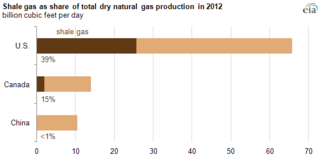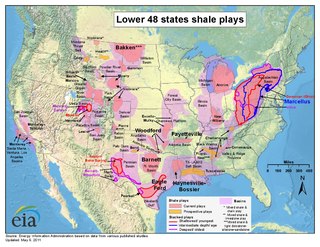Related Research Articles

Chevron Corporation is an American multinational energy corporation. It was founded in 1984 and is the third largest oil company in America. One of the successor companies of Standard Oil, it is headquartered in San Ramon, California, and active in more than 180 countries. Chevron is engaged in every aspect of the oil and natural gas industries, including hydrocarbon exploration and production; refining, marketing and transport; chemicals manufacturing and sales; and power generation. Chevron is one of the world's largest companies; as of March 2020, it ranked fifteenth in the Fortune 500 with a yearly revenue of $146.5 billion and market valuation of $136 billion. In the 2020 Forbes Global 2000, Chevron was ranked as the 61st-largest public company in the world. It was also one of the Seven Sisters that dominated the global petroleum industry from the mid-1940s to the 1970s.

Societatea Națională de Gaze Naturale Romgaz SA Mediaș or simply Romgaz is the largest natural gas producer in Romania and one of the largest producers in Eastern Europe. The company is the country's main supplier and responsible for producing around 40% of the total natural gas consumption in Romania.

Shale gas is natural gas that is found trapped within shale formations. Shale gas has become an increasingly important source of natural gas in the United States since the start of this century, and interest has spread to potential gas shales in the rest of the world. In 2000 shale gas provided only 1% of U.S. natural gas production; by 2010 it was over 20% and the U.S. government's Energy Information Administration predicts that by 2035, 46% of the United States' natural gas supply will come from shale gas.

Shale gas in the United States is an available source of natural gas. Led by new applications of hydraulic fracturing technology and horizontal drilling, development of new sources of shale gas has offset declines in production from conventional gas reservoirs, and has led to major increases in reserves of U.S. natural gas. Largely due to shale gas discoveries, estimated reserves of natural gas in the United States in 2008 were 35% higher than in 2006.

The inclusion of shale gas with conventional gas reserves has caused a sharp increase in estimated recoverable natural gas in Canada. Until the 1990s success of hydraulic fracturing in the Barnett Shales of north Texas, shale gas was classed as "unconventional reserves" and was considered too expensive to recover. There are a number of prospective shale gas deposits in various stages of exploration and exploitation across the country, from British Columbia to Nova Scotia.

Hydraulic fracturing, also called fracking, fracing, hydrofracking, fraccing, frac'ing, and hydrofracturing, is a well stimulation technique involving the fracturing of bedrock formations by a pressurized liquid. The process involves the high-pressure injection of "fracking fluid" into a wellbore to create cracks in the deep-rock formations through which natural gas, petroleum, and brine will flow more freely. When the hydraulic pressure is removed from the well, small grains of hydraulic fracturing proppants hold the fractures open.
Shale gas is natural gas produced from shale, a type of sedimentary rock. Shale gas has become an increasingly important source of natural gas in the United States over the past decade, and interest has spread to potential gas shales in Canada, Europe, Asia, and Australia. One analyst expects shale gas to supply as much as half the natural gas production in North America by 2020.
Frack Off is a grassroots direct action campaign aimed at stopping the extraction of unconventional resources in the UK, specifically concentrating on unconventional gas extraction.

Southwestern Energy is a natural gas exploration and production company organized in Delaware and headquartered in Spring, Texas. The company is ranked 776th on the Fortune 500.

The Vaca Muerta Formation, commonly known as Vaca Muerta is a geologic formation of Late Jurassic to Early Cretaceous age, located in the Neuquén Basin in northern Patagonia, Argentina. It is well known as the host rock for major deposits of shale oil and shale gas.

The 2012 Romanian protests were a series of protests and civil manifestations triggered by the introduction of new health reform legislation. In particular, President Traian Băsescu criticized the Deputy Minister of Health, Raed Arafat, on a Romanian television broadcast. The protests became violent, with both protesters and members of the Gendarmerie sustaining injuries during their clashes. On the morning of 5 February 2012, Prime Minister Emil Boc announced his resignation because of the protests. He said that his decision would release the tension in the country's political and social situation. Protests, on a lesser scale, continued in University Square in Bucharest. The protesters demanded the president's resignation and early general elections. There were ongoing protests in Romania in subsequent months over a variety of disagreements.

Hydraulic fracturing in the United Kingdom started in the late 1970s with fracturing of the conventional oil and gas fields near the North Sea. It has been used in about 200 British onshore oil and gas wells since the early 1980s. The technique did not attract attention until licences use were awarded for onshore shale gas exploration in 2008.

Hydraulic fracturing has become a contentious environmental and health issue with Tunisia and France banning the practice and a de facto moratorium in place in Quebec (Canada), and some of the states of the US.
Cuadrilla Resources is an oil and gas exploration and production company founded in 2007. It is headquartered in Bamber Bridge, Lancashire, and has operations in the United Kingdom. The company intend to develop shale gas in the UK by using hydraulic fracturing. Its chairman is Roy Franklin, OBE, who is also deputy chairman of Equinor. Its chief executive is Francis Egan.
An anti-fracking movement has emerged both internationally, with involvement of international environmental organizations and nation states such as France and locally in affected areas such as Balcombe, Sussex, in the UK Pungești in Romania, Žygaičiai in Lithuania, and In Salah in Algeria.
Shale gas in the United Kingdom has attracted increasing attention since 2007, when onshore shale gas production was proposed. The first shale gas well in England was drilled in 1875. A number of wells have been drilled, and favourable tax treatment has been offered to shale gas producers.

The Balcombe drilling protest occurred when test drilling and possible fracking for petroleum were proposed in 2012 near Balcombe, a village in West Sussex England. Local residents protested and anti-fracking environmentalists in the UK made it a focus of attention. The drill pad is located in a wooded area known as Lower Stumble Wood.

The 2013 Romanian protests against the Roșia Montană Project were a series of protests in Bucharest, Cluj-Napoca and dozens of other cities in Romania and abroad against the Roșia Montană mining project. The protesters say that the mining project would destroy the environment and heritage of Roșia Montană and demand the withdrawal of a law which would enable this project to commence. In Bucharest, protests are held every evening in the University Square and marches are held each Sunday.

The 2012–2014 Romanian protests against shale gas are an ongoing series of protests in major Romanian cities against exploitation of shale gas through controversial method of hydraulic fracturing. The main causes of these protests are the pollution of groundwater and environment, but also the threat of generating earthquakes. The protesters claim the resignation of Prime Minister Victor Ponta, because he suddenly changed his position on the project. Before the electoral campaign of 2012, he opposed shale drilling, and today he supports it with any risks, on the grounds that Romania's energy independence is a national project.

Hydraulic fracturing in South Africa is an energy production strategy in early stages of development using high-pressure drilling techniques to release natural gas trapped in shale rock. After initially imposing a moratorium on hydraulic fracturing in April 2011, the South African government lifted the moratorium in September 2012 after an initial investigation by an interdepartmental task team. Several energy companies were subsequently granted exploration licenses. Fracking in South Africa is a current topic of debate, with proponents pointing to substantial economic and energy benefits and opponents voicing concerns about potentially adverse environmental impacts.
References
- ↑ Claudia Pirvoiu (June 18, 2013). "Romgaz a descoperit gaze de sist in urma cu 17 ani si ar putea sa treaca la faza de exploatare dupa anumite evaluari". Hotnews. Retrieved 17 October 2013.
- 1 2 3 4 5 6 "Cum s-a schimbat pozitia USL fata de gazele de sist. De la motiune de cenzura pina la idee care trebuie tratata "serios pozitiv"". Hotnews. 9 January 2013. Retrieved 17 October 2013.
- 1 2 "Cabinetul Ponta a blocat stoparea exploatărilor de gaze de şist". România Liberă. July 6, 2012. Retrieved 17 October 2013.
- ↑ "Shale Gas Search Divides Romania". New York Times. April 22, 2012. Retrieved 17 October 2013.
- 1 2 "Trei contracte au fost desecretizate la presiunile SAR si ARC. Asteptam Barladul!". Alianța pentru o Românie Curată. 26 April 2012. Retrieved 16 October 2013.
- ↑ "Regal Petroleum renunţă la exploatația de la Bârlad". Evenimentul Zilei. 30 September 2010.
- 1 2 "Chevron halts east Romania shale gas search after protests". Reuters. October 17, 2013. Retrieved 17 October 2013.
- ↑ "Miting împotriva exploatării gazelor de şist! Vino şi tu! "Aducem sticle cu apă, va fi singura rezervă potabilă!"". Adevărul. April 26, 2012. Retrieved 17 October 2013.